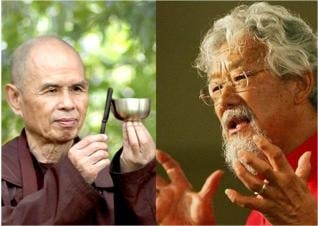Getting people to believe that they really can make a difference in the struggle to the save the planet from human folly can be just as important as encouraging them to take action, according to one of the world’s leading Buddhist scholars.
In Vancouver for a week of teaching and lectures, Buddhist monk, poet, peace and human rights activist, Thich Nhat Hanh, sat down with David Suzuki and Vancouver Mayor Gregor Robertson for an hour-long conversation on what it’s going to take to bring about the change in human behavior that is needed to put the world on a path that will ensure a healthy planet for future generations.
Faced with the question “What gives you hope that we can bring about the collective awakening needed to restore health to the planet? the three discussed a range of issues and ideas centred on actions that can make a real difference.
Their conversation, based on the premise that it is well known that humans are harming the earth, destroying its ecosystems and disrupting the climate, focused on the path forward to a more sustainable way of living.
Thich Nhat Hanh warned against the danger of people becoming overwhelmed by a feeling that the challenges are too big to overcome and therefore doing nothing to address them. Individuals need to know that they can make a difference if they remain hopeful and develop their inner strength.
Two short segments from the conversation are available here.
The conversation was structured around the following questions:
1. I would like your reaction to this economic advice a Lehman Brothers banker, named Paul Mazer, gave American business in 1930 when the age of consumerism was beginning: “People need to be trained to desire, to want new things even before the old have been entirely consumed…..Man’s desires must overshadow his needs.”
2. What gives you hope that we can bring about the collective awakening needed to restore health to the planet? Most of us know we are harming the earth, destroying its ecosystems and disrupting the climate. But we act as if it is not happening. How do we bring about the change in human behavior that is needed to put us on a path that will ensure a healthy planet for our children and grandchildren?
3. Oil industry groups over the past few decades have financed misinformation campaigns to cast doubt on climate science. Today 45 per cent of Americans mistakenly believe there is disagreement among climate scientists that global warming is even happening, this number is up 12 per cent since 2008. The number of climate scientists saying Climate Change isn’t happening is actually closer to zero. It seems to be very easy to pull the wool over the eyes of the public, why are we so gullible? What do you think we can we do to change from deniers of the environmental problems we face to responsible stewards of the environment?
4. What responsibility does government have for solving these problems? How do we motivate government to do the right thing?
5. Social science research in Canada and the US shows that public mistrust is at an all-time high. People believe Government and business say one thing and do another. They don’t trust Government; they don’t trust business and wonder about each other. This is particularly true when it comes to the environment. This mistrust has led to a kind of social paralysis where people believe their own actions won’t make a difference. How do we overcome this mistrust?
Subscribe to our newsletter
Stay up to date with DeSmog news and alerts







